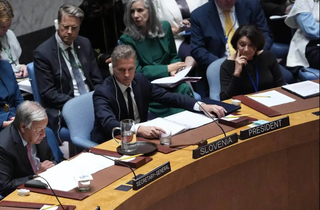UN Secretary-General Antonio Guterres described the situation as dire, stating that "hell is breaking loose in Lebanon," and called on the Security Council to work together to halt the violence between Israeli forces and Hezbollah militants along the Blue Line, the buffer zone in southern Lebanon. Guterres urged both sides to retreat from the brink of a potential regional conflict and warned of the massive displacement of civilians from southern and eastern Lebanon towards Beirut, as Hezbollah has launched more than 8,300 rockets, drones, and high-caliber missiles against Israel.
He stressed the importance of respecting Lebanon's sovereignty and reiterated the need for Lebanon to have full control of weapons within its borders, calling for strengthened support for the Lebanese Armed Forces.
Egyptian Foreign Minister Badr Ahmed Mohamed Abdelatty echoed Guterres' concerns, cautioning that the violence in Lebanon could spread to other parts of the region if the international community fails to act. "We are witnessing a machine of death and destruction," he said, urging global leaders to step in.
Lebanese Prime Minister Najib Mikati condemned the ongoing Israeli attacks, saying, "We cannot bear to lose another generation because of war," while Iranian Foreign Minister Seyyed Abbas Araghchi accused the international community of failing to hold Israel accountable for war crimes in Gaza, which he linked to the current crisis in Lebanon.
France has proposed a 21-day ceasefire between Hezbollah and Israel to prevent further escalation and allow for diplomatic negotiations, French Foreign Minister Jean-Noel Barrot announced. The United States has expressed support for the temporary truce, which would aim to halt the violence that has already caused hundreds of civilian casualties.
Meanwhile, Israel has begun preparations for a possible ground incursion into Lebanon, with Israeli Military Chief Herzi Halevi instructing troops to prepare for entry into Lebanese territory. Israeli warplanes conducted over 70 airstrikes on eastern and southern Lebanon on Wednesday evening, targeting areas around Baalbek, Hermel, and Western Bekaa.
The recent escalation follows two days of intense Israeli bombardments that killed more than 550 people and injured over 1,800 across Lebanon. Lebanese Environment Minister Nasser Yassin reported that more than 150,000 residents have been displaced in the past 72 hours alone.
The Arab League Council, meeting at the level of foreign ministers, has warned of the risk of a large-scale regional war if Israeli agggression continues, urging international intervention to prevent further instability in the region.
As the death toll continues to rise, diplomatic efforts are underway to prevent the conflict from spiraling into a wider regional war, with the Security Council and international leaders racing to broker peace before further devastation unfolds. (ILKHA)



 Güncel
Güncel
 Dünya
Dünya
 Güncel
Güncel
 Güncel
Güncel
 Güncel
Güncel
 Dünya
Dünya
 Dünya
Dünya
 Dünya
Dünya
 Güncel
Güncel
 Güncel
Güncel





